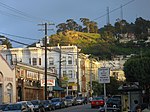Kite Hill, San Francisco
Castro District, San FranciscoParks in San FranciscoSan Francisco geography stubs

Kite Hill is a city park and natural area in the Castro district of San Francisco, California. At an elevation of 350 feet, the 2.87 acre park is named for its gusty winds. The natural area includes a panoramic view of San Francisco. Kite Hill was purchased by the city and incorporated into the San Francisco Natural Areas Program in 1977.
Excerpt from the Wikipedia article Kite Hill, San Francisco (License: CC BY-SA 3.0, Authors, Images).Kite Hill, San Francisco
Grand View Terrace, San Francisco
Geographical coordinates (GPS) Address Nearby Places Show on map
Geographical coordinates (GPS)
| Latitude | Longitude |
|---|---|
| N 37.758333333333 ° | E -122.44166666667 ° |
Address
Grand View Terrace
94114 San Francisco
California, United States
Open on Google Maps






